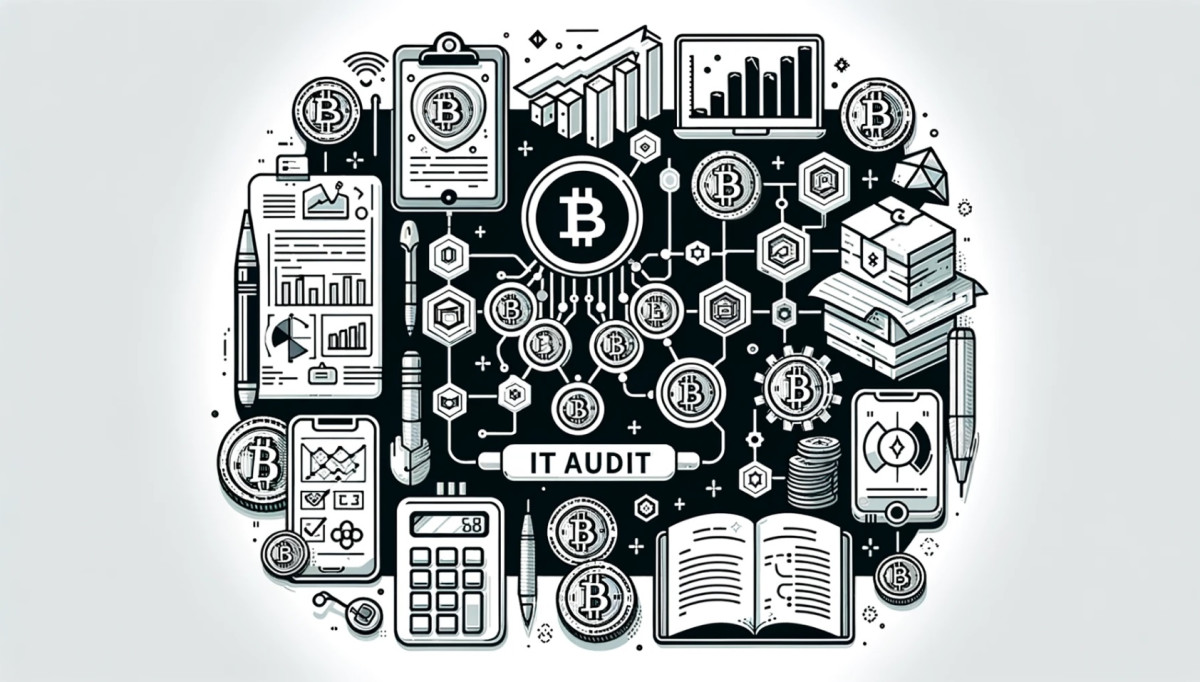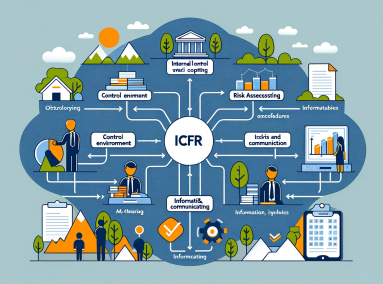IT Audit Revolutionizing Financial Integrity: The Evolution of IT Audits in Crypto Markets
23-11-26
본문
Section 1: The Evolving Landscape of Cryptocurrency and IT Auditing
Regulatory Challenges and Opportunities
In the dynamic world of cryptocurrency, IT auditors face a unique set of challenges and opportunities. The primary challenge is the lack of a standardized regulatory framework. Cryptocurrencies operate in a largely unregulated environment, which means traditional financial auditing frameworks are often inadequate. This lack of regulation presents a significant challenge for auditors who must navigate a landscape without established rules or benchmarks.
However, this challenge also presents opportunities. The absence of regulation has led to the development of innovative auditing techniques specifically tailored to the cryptocurrency market. Auditors are now exploring new methodologies and tools to effectively audit these digital assets. This includes the use of blockchain analytics tools that provide unprecedented levels of transparency and traceability in financial transactions.
Adapting Traditional Methods
Adapting traditional audit methodologies to suit the unique characteristics of cryptocurrencies is a significant trend in IT auditing. Traditional financial audit methods are not directly applicable to cryptocurrencies due to their decentralized nature and the underlying technology of blockchain. Therefore, auditors are increasingly integrating new technologies and approaches into their practices.
One such integration is blockchain analysis tools. These tools allow auditors to trace and verify transactions on the blockchain, providing a level of transparency and security not achievable with traditional auditing tools. Additionally, auditors are leveraging advanced data analytics to handle the vast volumes of data associated with cryptocurrency transactions. This enables more efficient and effective audits, as auditors can quickly identify anomalies and patterns that may indicate fraudulent activities or other concerns.
Embracing New Technologies
The rise of cryptocurrencies has necessitated the adoption of new technologies in IT auditing. Blockchain technology, the backbone of most cryptocurrencies, offers a transparent and immutable ledger of all transactions. This technology is a boon for auditors, as it provides a reliable and verifiable record of transactions. Auditors are now using blockchain explorers and other specialized software to audit cryptocurrency transactions.
Furthermore, the use of Artificial Intelligence (AI) and Machine Learning (ML) in auditing is becoming increasingly prevalent. These technologies can analyze large datasets quickly and efficiently, identifying trends and patterns that may be indicative of fraudulent activities or errors in financial reporting. AI and ML algorithms can also predict potential risks and provide insights that were previously unattainable through traditional auditing methods.
The Importance of Cybersecurity
In the realm of cryptocurrency, cybersecurity is a paramount concern. IT auditors must have a deep understanding of cybersecurity to effectively audit digital assets. This includes knowledge of how cryptocurrencies are stored (such as in digital wallets), transferred, and secured. Auditors must assess the security protocols of the platforms and wallets where these assets are held to ensure they are robust and can protect against hacking and other cyber threats.
Continuous Learning and Adaptation
Finally, continuous learning and adaptation are crucial for IT auditors in the cryptocurrency space. The rapid evolution of technology and the ever-changing landscape of the cryptocurrency market require auditors to be in a constant state of learning. This includes staying updated with the latest developments in blockchain technology, understanding new types of cryptocurrencies and tokens, and keeping abreast of regulatory changes and their implications for auditing practices.
In conclusion, the evolving landscape of cryptocurrency and IT auditing is marked by the need to adapt traditional methods, embrace new technologies, prioritize cybersecurity, and engage in continuous learning. These factors are critical for auditors to effectively navigate and audit in the complex and rapidly changing world of digital currencies.
Section 2: Year-by-Year Trends in Cryptocurrency IT Auditing
2021: The Rise of Data Analytics
In 2021, a notable shift towards data analytics in IT audits for cryptocurrencies was observed. A prime example of this was seen in a major cryptocurrency exchange audit. The auditors utilized advanced data analytics tools to analyze the vast volumes of transaction data. These tools enabled them to identify patterns and anomalies that were indicative of potential fraudulent activities.
The auditors examined transaction histories, wallet addresses, and the flow of funds using data visualization techniques. They were able to trace the origins and destinations of large transactions, flagging those that seemed irregular or inconsistent with typical user behavior. This approach not only helped in detecting potential fraud but also in understanding market trends and user behaviors.
2022: Blockchain Integration in Auditing
In 2022, the integration of blockchain technology in IT auditing became more pronounced. A significant case was the audit of a blockchain-based financial service provider. The auditors leveraged blockchain technology to access and verify transaction records directly on the blockchain, enhancing the transparency and accuracy of the financial reporting.
The auditors used blockchain explorers and specialized software to validate transactions and balances. This method allowed them to verify the authenticity of transactions without relying on traditional third-party verification methods. The blockchain's immutable nature ensured that the records were tamper-proof, providing a higher level of confidence in the audit results.
2023: AI and Machine Learning Trends (Fraud Detection)
Looking ahead to 2023, the focus is predicted to shift towards AI and machine learning in IT audits for cryptocurrencies. A hypothetical case study involves an IT audit firm developing an AI-powered tool that can analyze transaction patterns across various blockchains to identify potential fraud.
The tool uses machine learning algorithms to learn from historical data, recognizing patterns associated with fraudulent activities. It can flag transactions that deviate from the norm, alerting auditors to potential risks. This proactive approach allows auditors to focus on high-risk areas, making the audit process more efficient and effective.
Conclusion
These case studies illustrate the evolving nature of IT audits in the cryptocurrency space. From the rise of data analytics in 2021 to the anticipated focus on AI and machine learning in 2023, the field is rapidly adapting to the unique challenges presented by cryptocurrencies. Each year brings new technologies and methodologies, enhancing the ability of auditors to provide accurate and reliable audit services in this dynamic market.
Section 3: Expand the Focus - In-Depth Insights for IT Auditors in Cryptocurrency
Regulatory Changes and Compliance
Navigating the Evolving Regulatory Landscape
The cryptocurrency market is rapidly evolving, and with it, the regulatory framework is also changing. IT auditors need to stay informed about these changes to ensure that their practices are compliant with the latest regulations. For example, the European Union's proposed Markets in Crypto-Assets (MiCA) regulation aims to provide a harmonized framework for crypto-assets and could significantly impact how audits are conducted in member states. Understanding such regulatory shifts is crucial for auditors to offer relevant and compliant services.
Global Regulatory Variations
Different countries have varying approaches to cryptocurrency regulation. For instance, the U.S. treats cryptocurrencies as property for tax purposes, while the EU is moving towards a more unified regulatory approach. IT auditors must understand these differences, especially when dealing with international clients or audits that span multiple jurisdictions. This knowledge is essential to navigate the complex web of global cryptocurrency regulations effectively.
Technical Advancements in Auditing Tools
Emerging Technologies in Auditing
The integration of advanced technologies like AI, machine learning, and blockchain analytics into auditing tools presents significant opportunities for IT auditors. AI algorithms can detect anomalies in transaction patterns, enhancing audit efficiency and accuracy. Auditors should explore partnerships with tech companies or invest in in-house development of these tools to stay competitive.
Blockchain Analytics Tools
Blockchain analytics tools are becoming increasingly sophisticated, allowing auditors to trace transactions on public ledgers with greater accuracy. These tools can identify patterns indicative of fraudulent activity, such as money laundering or market manipulation. Auditors should be proficient in using these tools and understand their limitations and strengths.
Market Analysis and Cryptocurrency Trends
Understanding Market Dynamics
A deep understanding of cryptocurrency market dynamics is crucial. This involves analyzing market trends, major events (like Bitcoin halving), and the impact of macroeconomic factors on cryptocurrency prices. This knowledge aids in comprehensive audits and positions auditors as informed advisors.
Impact of Institutional Adoption
The increasing institutional adoption of cryptocurrencies (e.g., Tesla's investment in Bitcoin) is a significant trend that auditors need to understand. This trend can affect market stability and bring new regulatory scrutiny, impacting how audits are conducted.
Case Studies and Best Practices
Learning from Past Audits
Studying past cryptocurrency audits, including both successes and failures, is invaluable. For example, the audit of a DeFi project can reveal unique challenges related to auditing smart contract platforms. These case studies serve as practical learning tools for refining auditing methodologies.
Best Practices in Cryptocurrency Auditing
Developing and sharing best practices in cryptocurrency auditing is essential. This can include guidelines on assessing the security of crypto wallets, evaluating the robustness of smart contracts, and ensuring compliance with anti-money laundering (AML) regulations.
Technical Deep-Dive into Cryptocurrency Mechanisms
Blockchain Technology and Consensus Mechanisms
A thorough understanding of blockchain technology and consensus mechanisms (like proof-of-work and proof-of-stake) is crucial. Auditors should stay updated on developments in blockchain technology and understand how these affect the audit process.
Smart Contracts and Decentralized Finance (DeFi)
Understanding the technicalities of smart contracts and the DeFi ecosystem is becoming increasingly important. Auditors should be familiar with how these contracts work, their common vulnerabilities, and the implications for financial reporting and auditing.
Conclusion
For IT auditors in the cryptocurrency domain, the opportunities for growth and development are vast. Keeping up-to-date with regulatory changes, leveraging technological advancements, understanding market dynamics, learning from case studies, and possessing a deep technical knowledge of cryptocurrency mechanisms are key areas for expansion. This comprehensive approach not only enhances auditing capabilities but also positions auditors as thought leaders in this rapidly evolving field.
Section 4: The Role of AI and Machine Learning in Modern IT Auditing for Cryptocurrency
Introduction to AI and Machine Learning in IT Auditing
The integration of Artificial Intelligence (AI) and Machine Learning (ML) in IT auditing, particularly in the realm of cryptocurrency, represents a significant advancement in the field. These technologies offer unparalleled capabilities in analyzing complex data sets, identifying patterns, and predicting future trends, which are essential in the dynamic and often opaque world of cryptocurrency.
AI and ML in Fraud Detection and Prevention
Pattern Recognition and Anomaly Detection: AI algorithms excel at identifying patterns in data that would be imperceptible to human auditors. In cryptocurrency audits, these patterns could indicate fraudulent activities such as wash trading or pump-and-dump schemes. Machine learning models can be trained on historical data to recognize these patterns and flag potential fraud.
Automated Transaction Monitoring: AI systems can continuously monitor cryptocurrency transactions in real-time, providing an ongoing audit trail. This is crucial in the fast-paced crypto environment where transactions occur 24/7. These systems can instantly identify suspicious activities, such as unusual transaction volumes or rapid changes in wallet balances.
Enhancing KYC and AML Compliance: AI-driven tools can significantly improve Know Your Customer (KYC) and Anti-Money Laundering (AML) compliance. By analyzing transaction data, these tools can identify complex relationships and networks used in money laundering, ensuring that cryptocurrency platforms comply with regulatory standards.
Predictive Analytics in Cryptocurrency Auditing
Market Trend Analysis: AI and ML can analyze vast amounts of market data to identify trends and predict future market movements. This is particularly useful in the volatile cryptocurrency market, where traditional market analysis methods may fall short.
Risk Assessment Models: Machine learning models can assess the risk levels of different cryptocurrencies or transactions based on historical data. This helps auditors focus their efforts on higher-risk areas, improving the efficiency and effectiveness of the audit process.
Behavioral Analysis for Insider Trading: AI tools can analyze trading behaviors to detect signs of insider trading. By examining patterns such as the timing of trades and the movement of funds between wallets, these tools can provide valuable insights into unethical practices.
Case Studies and Examples
Audit of a Large Cryptocurrency Exchange: A case study where AI was used to audit a major cryptocurrency exchange, focusing on how the technology helped identify fraudulent activities and ensured regulatory compliance.
Smart Contract Audits: An example of using AI to audit smart contracts on the Ethereum blockchain, highlighting how AI tools detected vulnerabilities and potential exploits in the contract code.
Challenges and Ethical Considerations
Data Privacy and Security: As AI and ML rely heavily on data, ensuring the privacy and security of sensitive information is paramount. Auditors must navigate the ethical and legal implications of using personal data in their audits.
Bias and Reliability of AI Models: There is a risk of bias in AI models, especially if they are trained on skewed or incomplete data sets. Auditors must be aware of these limitations and ensure that their AI tools are as unbiased and reliable as possible.
Keeping Pace with Rapid Technological Changes: The rapid evolution of AI and ML technologies means that auditors must continually update their skills and knowledge. This includes understanding the latest developments in AI algorithms and machine learning techniques.
Conclusion
The incorporation of AI and Machine Learning into IT auditing for cryptocurrency is transforming the field, offering enhanced capabilities for fraud detection, predictive analytics, and compliance. However, this integration also brings challenges and ethical considerations that auditors must carefully navigate. Staying informed and adapting to these technological advancements is crucial for auditors to remain effective and relevant in the ever-evolving landscape of cryptocurrency auditing.
Source:
- AICPA
- ISACA
- Deloitte: Impact of Blockchain in Accounting (https://www2.deloitte.com/us/en/pages/audit/articles/impact-of-blockchain-in-accounting.html)
- Deloitte: Corporates Using Crypto (https://www2.deloitte.com/us/en/pages/audit/articles/corporates-using-crypto.html)
- RSM: How Blockchain Technology Will Affect the Audit (https://rsmus.com/insights/services/audit/how-blockchain-technology-will-affect-the-audit.html)



